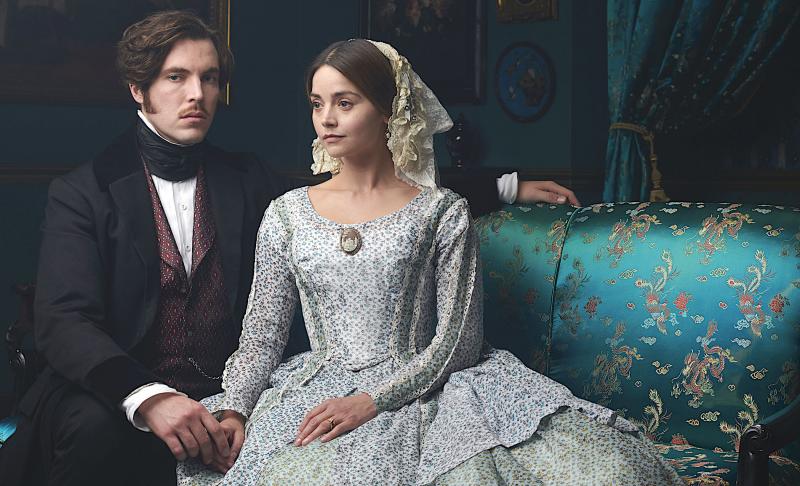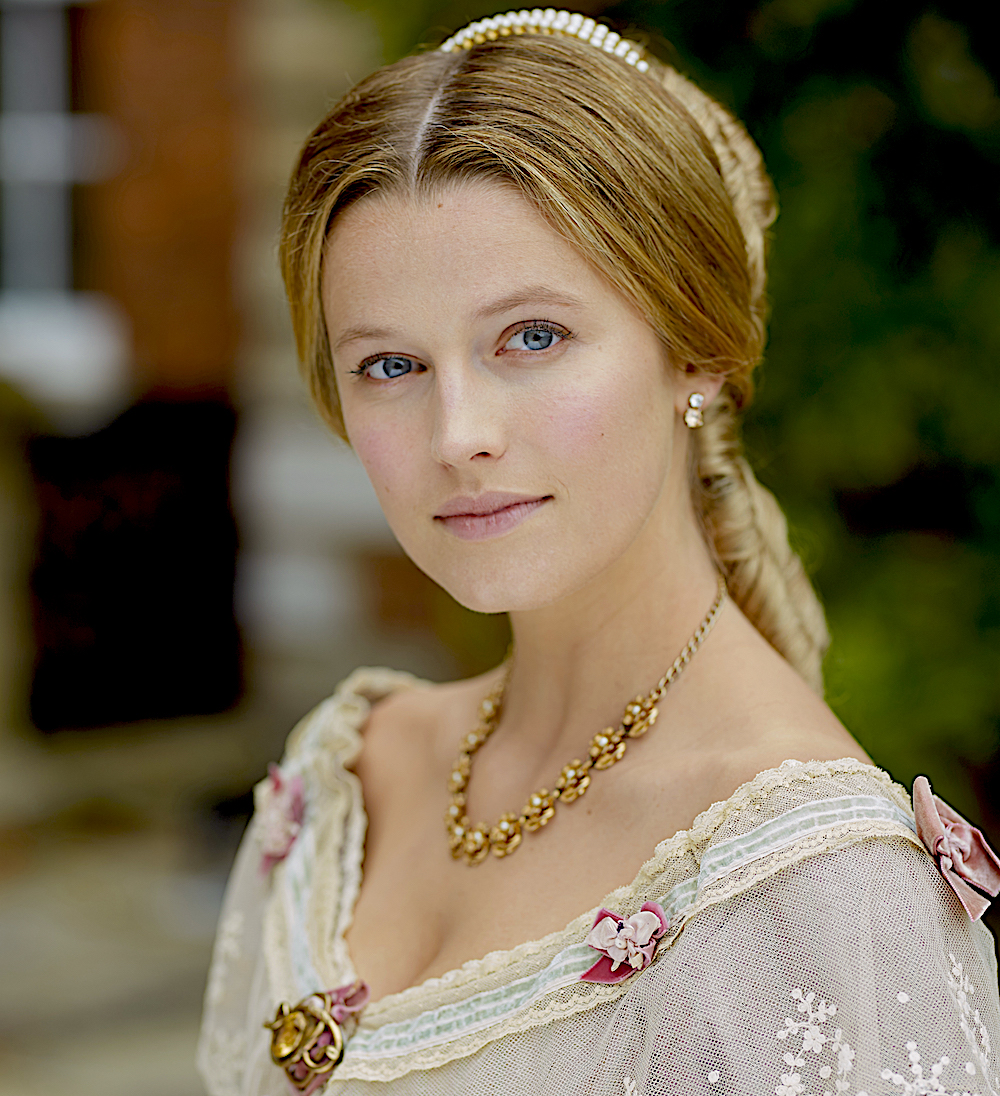Victoria, Series 3, ITV review - can Her Maj cope with the Age of Revolution? | reviews, news & interviews
Victoria, Series 3, ITV review - can Her Maj cope with the Age of Revolution?
Victoria, Series 3, ITV review - can Her Maj cope with the Age of Revolution?
Jenna Coleman rises to the occasion as violent change rocks the monarchy

ITV has an enviable knack for creating populist historical costume dramas which never seem to wear out, despite a million rotations on ITV3.
The third series dawned with a whiff of gunpowder in the air. It’s 1848, and revolutionary zeal is sweeping across Europe. No royal family is safe, and France’s King Louis Philippe – Vincent Regan, speaking English in the style of Michel Barnier – has had to take hasty evasive action via the Parisian drainage network to get out with his head still attached to his shoulders. In Britain, the Chartists are getting rowdy with their demands for voting rights for working people and a more democratic Parliament, and they’re making the royal household a bit twitchy.
 Victoria’s mood has not been improved by the incendiary, grandstanding speeches of Foreign Secretary Lord Palmerston (a strutting and supercilious Laurence Fox, pictured right), who has hailed the overthrow of the French “tyrant” and was swift to make friendly contact with France’s new Republican government. Mind you, in private the vain and arrogant Palmerston is more apt to say things like “I don’t know why we don’t lock them all up” or (to Prince Albert) “if we give the vote to an illiterate mob we’re signing our own death warrants.”
Victoria’s mood has not been improved by the incendiary, grandstanding speeches of Foreign Secretary Lord Palmerston (a strutting and supercilious Laurence Fox, pictured right), who has hailed the overthrow of the French “tyrant” and was swift to make friendly contact with France’s new Republican government. Mind you, in private the vain and arrogant Palmerston is more apt to say things like “I don’t know why we don’t lock them all up” or (to Prince Albert) “if we give the vote to an illiterate mob we’re signing our own death warrants.”
Anyway, tension mounted dramatically when Victoria controversially agreed to shelter Louis Philippe in London. As Chartists marched on the capital and started chucking rocks through the palace windows, only the sudden onset of childbirth prevented Victoria and Albert high-tailing it for the relative safety of the Isle of Wight.
Happily, writer Daisy Goodwin has been able to avoid the old trap of letting the tyranny of historical events overwhelm the internal coherence of her story, and there was much to savour in the interplay of characters. As Victoria, Jenna Coleman is now wielding her authority with an assured touch, despite the occasional vocal inflection amusingly reminiscent of Michelle Dockery’s Lady Mary from Downton. Even so, her inner struggle over whether to shelter overthrown European royalty was causing her palpable anguish, not helped by the insolent interventions from Palmerston (“these days you can’t be too careful with the company you keep”). Eventually she found him so aggravating that she expelled him from her presence.
 As Albert, Tom Hughes brings both sympathy and practicality. Horrified by a tour of squalid working-class dwellings, Albert feels a change in the wind and has picked up the baton of social improvement – “this country needs more than bluster, it needs change,” he declared. The intrepid queen has gone so far as to cross the species barrier and meet a real Chartist, Abigail Turner, who was introduced to her by her seamstress Skerrett (Nell Hudson).
As Albert, Tom Hughes brings both sympathy and practicality. Horrified by a tour of squalid working-class dwellings, Albert feels a change in the wind and has picked up the baton of social improvement – “this country needs more than bluster, it needs change,” he declared. The intrepid queen has gone so far as to cross the species barrier and meet a real Chartist, Abigail Turner, who was introduced to her by her seamstress Skerrett (Nell Hudson).
Meanwhile, it seems that Albert is being viewed with more than casual interest by Victoria’s half-sister Feodora of Leiningen (Kate Fleetwood), another royal refugee from Europe’s Republican spring and now playing the role of pitiful lost soul, drifting round the palace like a forlorn ghost in need of a wealthy benefactor. Perhaps she’ll catch Palmerston’s lascivious eye, though he may be more intrigued by Duchess Sophie (Lily Travers, pictured above), despite the fact that her father was a shopkeeper. It’s surprisingly addictive, though the CGI budget could do with an upgrade, because the wishy-washy artists’ impressions of the London skyline are mystifyingly inept.
The future of Arts Journalism
You can stop theartsdesk.com closing!
We urgently need financing to survive. Our fundraising drive has thus far raised £49,000 but we need to reach £100,000 or we will be forced to close. Please contribute here: https://gofund.me/c3f6033d
And if you can forward this information to anyone who might assist, we’d be grateful.

Subscribe to theartsdesk.com
Thank you for continuing to read our work on theartsdesk.com. For unlimited access to every article in its entirety, including our archive of more than 15,000 pieces, we're asking for £5 per month or £40 per year. We feel it's a very good deal, and hope you do too.
To take a subscription now simply click here.
And if you're looking for that extra gift for a friend or family member, why not treat them to a theartsdesk.com gift subscription?
more TV
 Mr Scorsese, Apple TV review - perfectly pitched documentary series with fascinating insights
Rebecca Miller musters a stellar roster of articulate talking heads for this thorough portrait
Mr Scorsese, Apple TV review - perfectly pitched documentary series with fascinating insights
Rebecca Miller musters a stellar roster of articulate talking heads for this thorough portrait
 Down Cemetery Road, Apple TV review - wit, grit and a twisty plot, plus Emma Thompson on top form
Mick Herron's female private investigator gets a stellar adaptation
Down Cemetery Road, Apple TV review - wit, grit and a twisty plot, plus Emma Thompson on top form
Mick Herron's female private investigator gets a stellar adaptation
 theartsdesk Q&A: director Stefano Sollima on the relevance of true crime story 'The Monster of Florence'
The director of hit TV series 'Gomorrah' examines another dark dimension of Italian culture
theartsdesk Q&A: director Stefano Sollima on the relevance of true crime story 'The Monster of Florence'
The director of hit TV series 'Gomorrah' examines another dark dimension of Italian culture
 The Monster of Florence, Netflix review - dramatisation of notorious Italian serial killer mystery
Director Stefano Sollima's four-parter makes gruelling viewing
The Monster of Florence, Netflix review - dramatisation of notorious Italian serial killer mystery
Director Stefano Sollima's four-parter makes gruelling viewing
 The Diplomat, Season 3, Netflix review - Ambassador Kate Wyler becomes America's Second Lady
Soapy transatlantic political drama keeps the Special Relationship alive
The Diplomat, Season 3, Netflix review - Ambassador Kate Wyler becomes America's Second Lady
Soapy transatlantic political drama keeps the Special Relationship alive
 The Perfect Neighbor, Netflix review - Florida found-footage documentary is a harrowing watch
Sundance winner chronicles a death that should have been prevented
The Perfect Neighbor, Netflix review - Florida found-footage documentary is a harrowing watch
Sundance winner chronicles a death that should have been prevented
 Murder Before Evensong, Acorn TV review - death comes to the picturesque village of Champton
The Rev Richard Coles's sleuthing cleric hits the screen
Murder Before Evensong, Acorn TV review - death comes to the picturesque village of Champton
The Rev Richard Coles's sleuthing cleric hits the screen
 Black Rabbit, Netflix review - grime and punishment in New York City
Jude Law and Jason Bateman tread the thin line between love and hate
Black Rabbit, Netflix review - grime and punishment in New York City
Jude Law and Jason Bateman tread the thin line between love and hate
 The Hack, ITV review - plodding anatomy of twin UK scandals
Jack Thorne's skill can't disguise the bagginess of his double-headed material
The Hack, ITV review - plodding anatomy of twin UK scandals
Jack Thorne's skill can't disguise the bagginess of his double-headed material
 Slow Horses, Series 5, Apple TV+ review - terror, trauma and impeccable comic timing
Jackson Lamb's band of MI5 misfits continues to fascinate and amuse
Slow Horses, Series 5, Apple TV+ review - terror, trauma and impeccable comic timing
Jackson Lamb's band of MI5 misfits continues to fascinate and amuse
 Coldwater, ITV1 review - horror and black comedy in the Highlands
Superb cast lights up David Ireland's cunning thriller
Coldwater, ITV1 review - horror and black comedy in the Highlands
Superb cast lights up David Ireland's cunning thriller
 Blu-ray: The Sweeney - Series One
Influential and entertaining 1970s police drama, handsomely restored
Blu-ray: The Sweeney - Series One
Influential and entertaining 1970s police drama, handsomely restored

Add comment